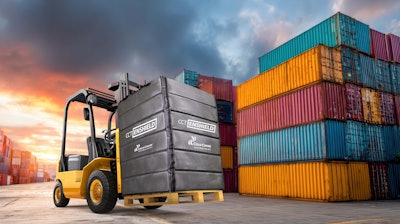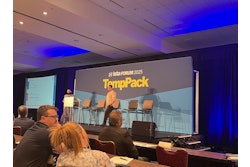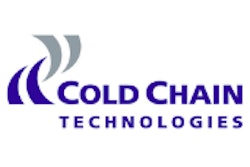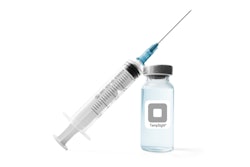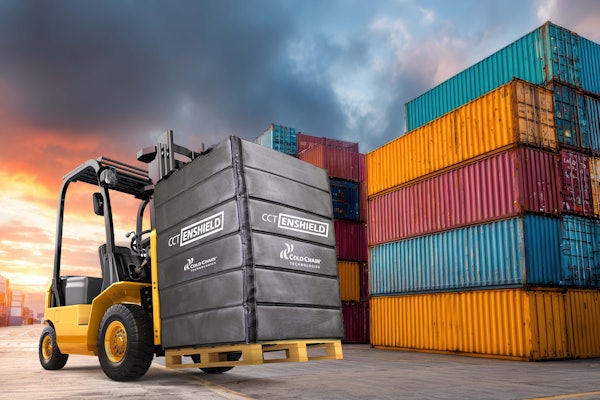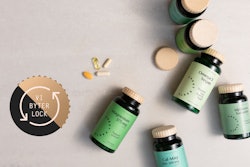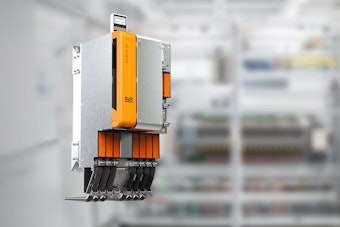Key Takeaways:
- The goal: to maintain strict temperature control over one of the world’s longest and most demanding sea routes while ensuring full compliance and product integrity.
- After a two-year testing period and numerous trials, Teva successfully validated the global transportation of temperature-sensitive medicines by sea.
- CCT’s Enshield thermal blanket is a phase-change material solution designed to maintain the critical 2–8°C range even under extreme environmental stress.
When Teva Pharmaceuticals set out to explore sustainable, cost-effective alternatives to air freight for global pharmaceutical logistics, the company knew the challenge ahead would be immense. The goal: to maintain strict temperature control over one of the world’s longest and most demanding sea routes—from Germany to Australia—while ensuring full compliance and product integrity.
After a two-year testing period and numerous trials, Teva successfully validated the global transportation of temperature-sensitive medicines by sea. This achievement marked the culmination of a collaborative “white glove” partnership with logistics leader Kuehne + Nagel and technology partner Cold Chain Technologies (CCT).
A Mission to Make Sea Freight Work for Pharma
“Shipping by sea offers some compelling benefits over air travel, especially on long-haul journeys,” explains Judineth Miranda, Sr. Director of Key Account Management Healthcare at Kuehne + Nagel. “As well as being cheaper to operate, it is much more sustainable – one pallet of air freight flown from France to Singapore produces five times more CO₂ than 22 sea freight pallets. Sea cargo is also more secure; barring (rare) customs inspections, the pallet is manipulated only by the shipper and consignee.”
But for Teva, success would depend on ensuring stability and compliance across long, unpredictable journeys. Given the company’s commitment to patient safety and strict regulatory standards, the testing had to occur in real-world conditions—not just digital simulations.
Testing the Limits
This led Kuehne + Nagel and Teva to establish a rigorous testing process, using a hugely challenging sea lane (Germany to Australia) to put the shipment through its paces. “This is a long journey with significant seasonal and temperature variations, which meant that a successful test would allow them to qualify many lanes in a single study,” explains Miranda.
Kuehne + Nagel and Teva initially relied only on traditional thermal covers to complement the active containers being used, but identified the need for additional protection against an increasing number of power outages occurring in transit in recent years.
Given the seasonal extremes between departure and destination, the partners realized that multiple tests were required during a 12-month period – i.e. summer and winter departures. And because of the time involved, if one trial failed during that season, there would be no chance to reship until the equivalent season the following year.
Initial trials with traditional blankets resulted in temperature excursions during transit, meaning a long wait until the next trial – but this delay also enabled Kuehne + Nagel and Teva to rethink the strategy. To enhance temperature stability during transit, they tested the Enshield passive thermal blanket (from CCT), which demonstrated significant advantages over other available options.
“We focused on thermal mass and optimized airflow, which is why the type of thermal blankets have been changed to a PCM blanket cover, to optimize the shipment for the variations in temperature. It was vital to position pallets properly, which ultimately led to the use of cardboard on the container floor to cover ‘empty’ space and keep air circulating,” explains Fabian Reitmeier, Project Manager Logistics Integrity at Teva Logistics.
This shift led to the introduction of CCT’s Enshield thermal blanket, a phase-change material (PCM) solution designed to maintain the critical 2–8°C range even under extreme environmental stress.
“Traditional blankets are flawed – because once hot air gets inside, it can get trapped. Enshield is designed to keep products within 2 and 8 degrees C – if the temperature rises above or falls below that, the phase-change material slows down the thermal exchange to keep things balanced and compliant,” says Kristian Williams, Senior Director of Sales – EMEA & APAC at Cold Chain Technologies.
Enshield uses leakproof Koolit Advanced gel, a form-stable PCM that never turns to liquid. It is also highly flexible, which means Enshield can be wrapped around the pallet for a snug fit.
A Journey Full of Challenges with a Stable Finish
The final and most crucial test took place in late 2023. The shipment departed Germany in November, bound for Australia—a roughly 60-day voyage that would soon test every aspect of Teva’s solution.
And here came the challenges. First came a closure of the Suez Canal, forcing a reroute around the Cape of Good Hope and adding more than a week to the journey. Then, an unexpected power outage struck in the Indian Ocean, followed by further delays upon arrival in Sydney, where port operations slowed during the Australia Day holiday amid 40°C heat.
Despite the setbacks, temperature loggers showed that the cargo stayed within range, with only two minor fluctuations—both well within acceptable parameters.
“Pretty much everything that could go wrong did,” recalls Reitmeier. “But the cargo maintained its temperature integrity throughout the entire 10-week trip.”
The results confirmed that Teva’s sea freight strategy could deliver compliant, temperature-stable pharmaceuticals over long, complex routes.
According to Miranda, the project’s success came down to two factors. “First, the ‘white glove’ management from Kuehne + Nagel, ensuring continuous oversight. Second, the resilience of Enshield, which provided essential back-up protection when power was lost....This was the most challenging run we did, but the one that performed best – and it’s clear that Enshield was crucial to this success.”
A look at the outcomes
· Demonstrated sea freight as a sustainable, cost-effective alternative for pharmaceutical logistics/reduction of CO2 footprint
· Validated Enshield as a reliable passive thermal PCM blanket
· Managed to qualify many lanes in one single study
· Reduce cost vs air travel
· Enshield used in combination with an active unit ensure additional thermal protection in case of power failure and during loading and unloading
